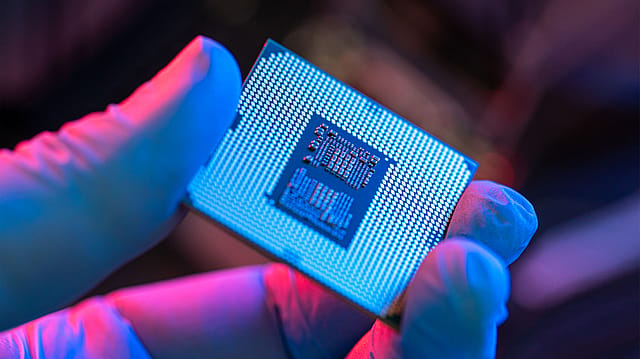Intel pitches geopolitical balance in supply chain
ADVERTISEMENT

As the digital revolution is progressing rapidly, along with it a pressing need is being realised in the form of a geopolitical balance for the electronics manufacturing sector. While identifying a huge opportunity for India, Intel India managing director, Santhosh Viswanathan, says that manufacturing is going to be a big vector for job creation amongst the burgeoning youth population. “The whole digitisation, India stack, and the framework the country has is unmatched,” he adds.
At the same time, the India business head clarifies that the company has no plans to set up a semiconductor plant or any type of manufacturing unit in the country at present.
"At this point in time, we don't have any plans to go back and do a fab or go back, building any manufacturing capacity in India. It doesn't mean that the engagement will stop. What matters is, how we can rebuild the infrastructure and set it up for years ahead," he says at a roundtable.
However, the computer chip maker will work with partners to enable the manufacturing ecosystem in the country. Viswanathan says that India has just begun its journey in the manufacturing space and has 'enough runway for growth and enough opportunity to build momentum’.
Intel has had its design centre in India, for longer than three decades and has invested more than $9 billion in the facility.
January 2026
Netflix, which has been in India for a decade, has successfully struck a balance between high-class premium content and pricing that attracts a range of customers. Find out how the U.S. streaming giant evolved in India, plus an exclusive interview with CEO Ted Sarandos. Also read about the Best Investments for 2026, and how rising growth and easing inflation will come in handy for finance minister Nirmala Sitharaman as she prepares Budget 2026.
Pointing out Intel’s peers who work on more advanced semiconductor nodes of 7 nanometers (nm) and below, Viswanathan explains it’s a more complex consideration for the company as manufacturing these advanced nodes will be highly capital intensive. This will require a proper supply and demand ecosystem, multi-million-dollar equipment, and skilled labour to run the fabs.
He adds, “Setting up fabs or manufacturing plants for advanced nodes, companies will require significant water, land and electricity access to the tune of 350 MW of power every day. Moreover, there will also be the requirement of a proper regulatory environment, right processes to run waste management and more capital and financing assets from the government.”
In fact he says that if one were to look at a leading edge fab, it would be highly capital intensive and cost nearly $10-20 billion to build.
More recently, the pandemic has shown, from reducing dependence on imports and trade deficits to generating employment opportunities and fostering innovation, the need for a resilient and equitable global electronics manufacturing is essential.
Echoing similar views, Viswanathan is bullish on the opportunity for India in terms of a diversified electronics supply chain. The existing challenge in electronics manufacturing is that the majority of the products are ‘concentrated in very few parts of the world’.
“The world needs a balanced supply-chain. You cannot have 80% of servers being made in one place and 90% of laptops made in another. That's where India can step up and help build a balanced electronics supply," he suggests.
On artificial intelligence (AI), Viswanathan says India has about 20% of the world's data set that can be used for AI models training. Although, he believes the nation is quite frugal in this aspect. While India leads the world in terms of AI talent with nearly 16-20% of the global pool, the country has not pushed through in this domain.
“That’s another piece which makes me bullish about India. There is no country which has a digital infrastructure like ours... India’s stack is a game changer,” he says.
